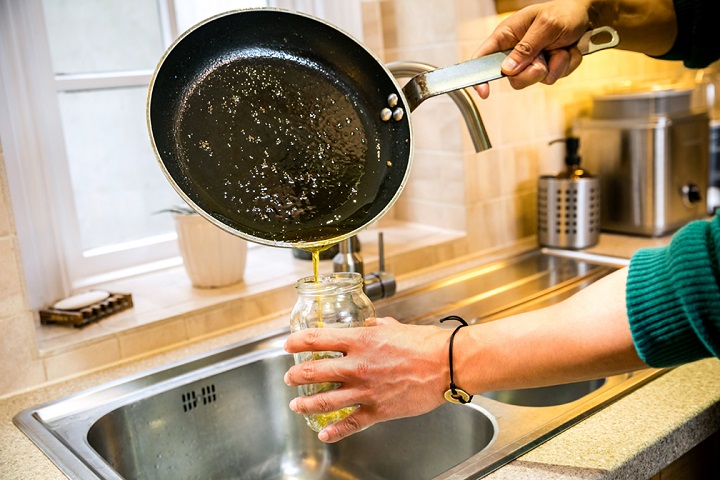Don’t let custard and gravy block your waste pipes this Christmas!
Thursday 21st December 2023 12:06

A customer pours used oil from a frying pan into a glass jar.
This festive season the UK’s largest water company is highlighting the perils of pouring gravy, fats, oils and greases from festive meals down the drain.
Thames Water clears around 75,000 blockages(1) from its sewers each year and around 200 blockages each day from homes across London, the Home Counties and the Thames Valley. The company estimates 60 per cent of sewer flooding in homes each year is caused by blockages and is urging customers to help fight fatbergs this festive season, when it often sees an increase in fatbergs and blockages following the Christmas period compared to the rest of the year.
From the start of December 2022 to the end of February 2023, Thames Water cleared 5,447 blockages caused by fats, oils and greases from its public network. This compared to 4,807 blockages in summer 2023 (June 2023 – August 2023).(2)
Danny Leamon, Director of Waste for Thames Valley and Home Counties, at Thames Water said: “With Christmas around the corner we’re reminding customers to be careful with what they flush down the loo and pour down the sink, to help prevent unwanted blockages ruining their Christmas and New Year celebrations.
“We all love tucking into a Christmas lunch but leftover custard, gravy and fats, oils and greases from roasted meat and potatoes do not belong in your sewers. If you use wetwipes and kitchen roll to mop up spills during cooking or after dinner, please also put these in the bin. Only the three Ps: pee, poo, paper should be flushed away.”
Bin it – don’t block it
Thames Water’s website has handy tips on how to prevent blocked pipes around your home and the company shares these on social media as part of its Bin it – don’t block it campaign:
- Cooking fats, greases and oils, can be collected and cooled in a container like a jam jar or yoghurt pot before being scooped out and put in the bin.
- ‘Liquid’ food such as gravy, or left over cream and custard can be soaked up with kitchen roll or newspaper and put in the bin.
- Wipes, condoms, sanitary products, cotton wool, and dental floss are some of the biggest blockage offenders in Thames Water’s sewers. Throw them in the bin, not the loo. The three Ps is the best rule to remember when it comes to what’s flushable; pee, poo, paper. Nothing else!
- If your kitchen sink or toilet drain is blocked, don’t use washing up liquid to try and clear it. Hot water and soap do not dissolve oils and fats. The soap may actually harden in your pipes, sticking to other items and adding to the problem.
Thames Water cleans and maintains 68,000 miles of sewers across London, Home Counties and the Thames Valley. The company uses four-wheeled robots fitted with cameras to check and record footage of its sewers, cataloguing what they find, including fatbergs caused by wet wipes, mixing with fats, oils and greases that are poured down drains.
Since April this year Thames Water has visited over 5,000 restaurants, pubs and other food service establishments to help them install effective grease management systems.
- These blockages can be caused by multiple factors including fats, oils and greases; wet wipes and sanitary products or sometimes by other causes such as roots, debris, silt and third parties.
- Blockage clearance data is collected by Thames Water as part of its annual performance reporting. Cited figures relate to blockages caused by fats, oils and greases on Thames Water’s public sewer network.
